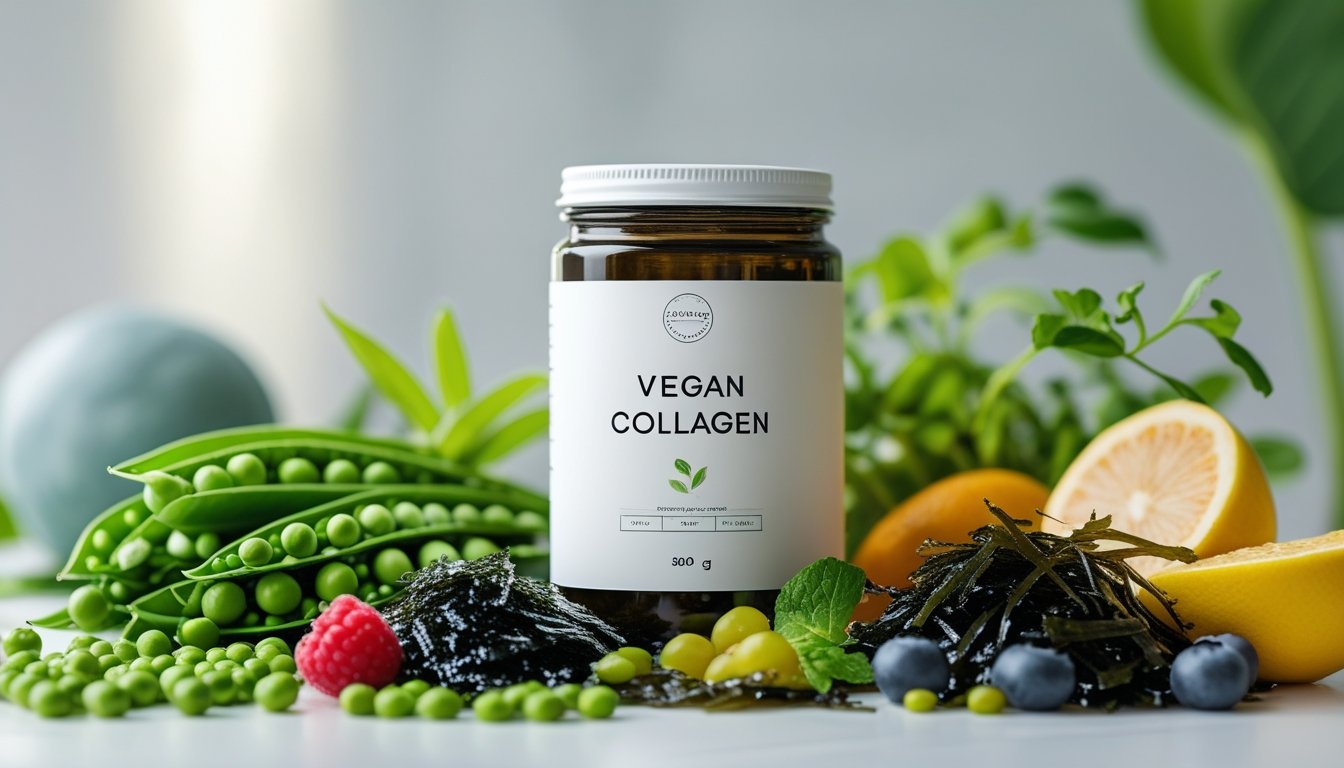Vegan collagen is revolutionizing the beauty and wellness industry, offering ethical, sustainable, and effective ways to support your skin, hair, and joint health.
If you’re seeking to boost your body’s collagen without animal-derived ingredients, understanding vegan collagen and its top plant-based alternatives is essential.
In this guide, we’ll explore how vegan collagen works, its core benefits, and the four most effective plant-based alternatives—empowering you to make informed choices for your health and the planet.
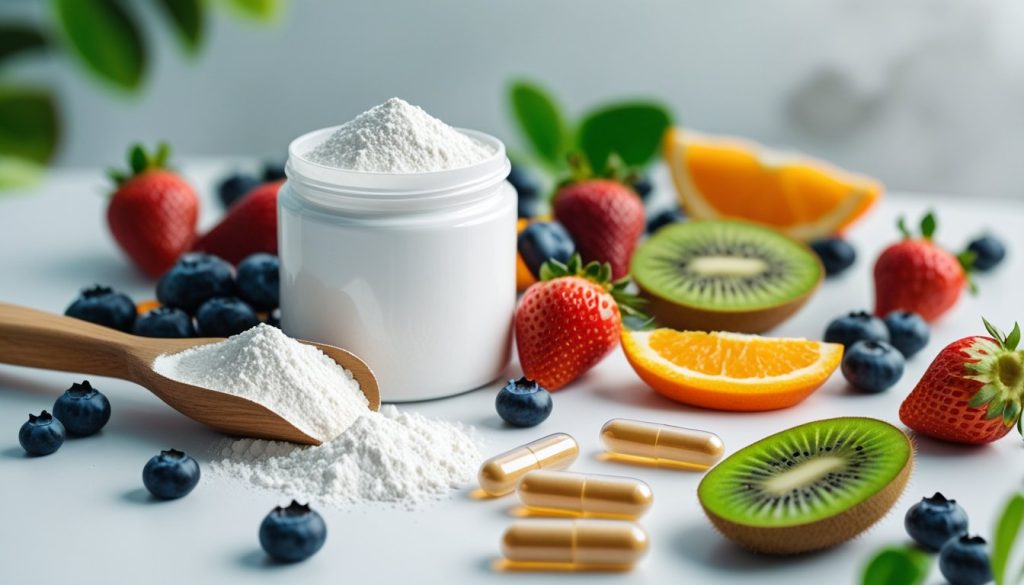
What Is Vegan Collagen?
Unlike traditional collagen, which is sourced from animal bones, skin, or fish, vegan collagen refers to plant-based formulations that supply the body with the amino acids and nutrients needed to stimulate its own collagen production1113. While true collagen only exists in animals and humans, innovative vegan collagen products mimic the amino acid profile of human collagen and provide the building blocks—such as glycine, proline, and lysine—essential for natural collagen synthesis31011.
How Does Vegan Collagen Work?
Vegan collagen supplements and foods don’t contain collagen itself. Instead, they deliver:
- Amino acids (glycine, proline, lysine)
- Vitamin C
- Minerals like zinc, copper, and silicon
- Antioxidants and plant extracts
These nutrients support your body’s ability to create and maintain healthy collagen, leading to firmer skin, stronger hair and nails, and more resilient joints13711.
Why Choose Vegan Collagen?
- Ethical & Cruelty-Free: No animal ingredients or byproducts1113.
- Sustainable: Lower environmental impact compared to animal-derived collagen7.
- Hypoallergenic: Free from common animal allergens (e.g., fish, shellfish)11.
- Inclusive: Suitable for vegans, vegetarians, and those with dietary restrictions7.
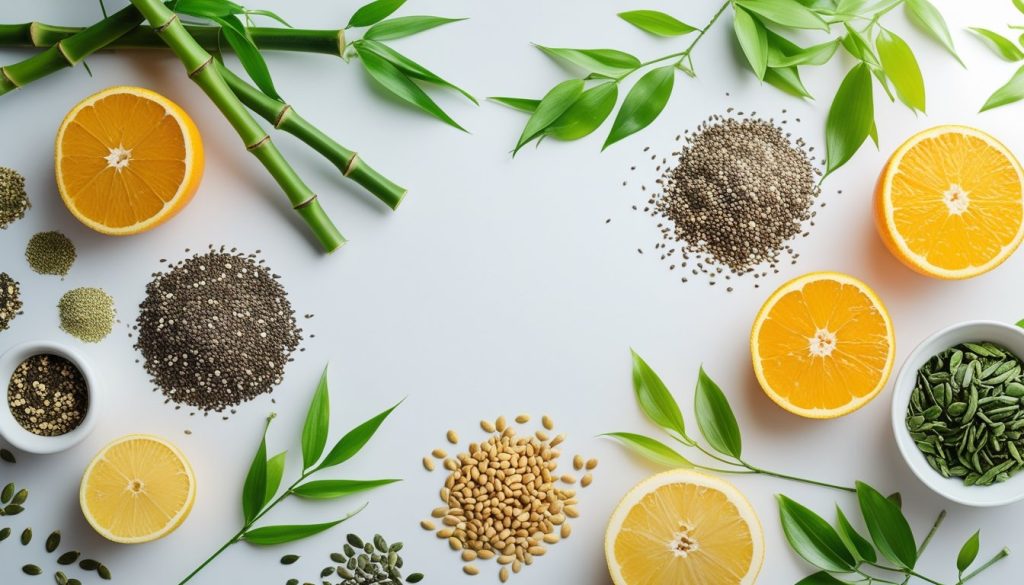
The 4 Best Plant-Based Alternatives to Collagen
1. Amino Acid Complexes (Vollagen®, VeCollal®)
Modern vegan collagen supplements, such as those containing Vollagen® or VeCollal®, offer a blend of amino acids that identically mimic the profile of human collagen3910. These complexes are designed for optimal absorption, providing your body with the exact building blocks for collagen creation.
Key Benefits:
- Mimic human collagen structure
- Boost natural collagen synthesis
- Often combined with vitamin C, zinc, and hyaluronic acid for enhanced results3910
Popular Products:
- Cosphera Vegan Collagen Formation Capsules
- Bulk™ Vegan Collagen Powder
- Qsilica Vegan Collagen Capsules
2. Silica-Rich Plant Extracts (Bamboo, Horsetail)
Silica is a mineral crucial for collagen formation and skin elasticity. Bamboo extract, in particular, is a potent source of natural silica and is frequently included in vegan collagen boosters13.
Key Benefits:
- Supports skin firmness and hydration
- Strengthens hair and nails
- Enhances elasticity and resilience13
Usage:
Look for vegan collagen supplements with bamboo or horsetail extract, or incorporate silica-rich foods like leafy greens and whole grains into your diet.
3. Vitamin C and Antioxidant Superfoods
Vitamin C is essential for collagen synthesis, acting as a cofactor in the enzymatic processes that build and stabilize collagen fibers61113. Antioxidant-rich foods and extracts, such as green tea, berries, and citrus fruits, protect collagen from oxidative damage and support skin health.
Top Sources:
- Citrus fruits (oranges, lemons, kiwi)
- Strawberries and other berries
- Green tea extract
- Rosehip and acerola cherry613
Benefits:
4. Peptides and Plant-Based Protein Isolates
Peptides—short chains of amino acids—are proven to stimulate collagen production in the skin. Vegan peptide-rich creams and supplements use plant proteins from sources like peas, rice, flaxseed, and pumpkin seeds to deliver a complete amino acid profile57.
Benefits:
- Stimulate collagen synthesis
- Improve skin elasticity and hydration
- Repair and strengthen connective tissue57
Usage:
Opt for vegan collagen powders or creams with added peptides or plant protein isolates for a comprehensive approach.
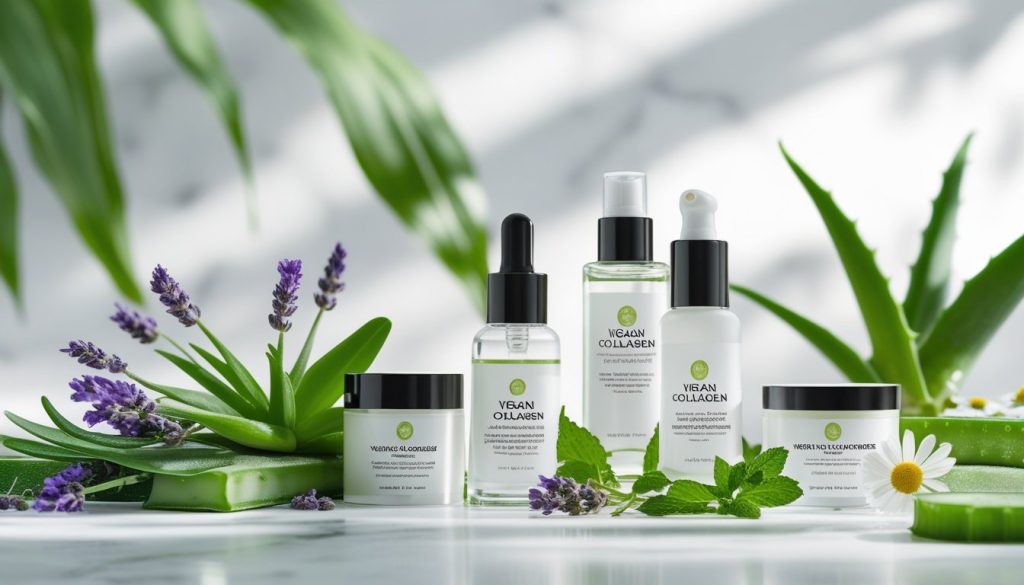
How Effective Are Vegan Collagen Alternatives?
Clinical studies and user reports indicate that vegan collagen boosters can significantly improve skin hydration, elasticity, and overall appearance78. Advanced formulas using bio-identical amino acid blends (like VeCollal® or Vollagen®) are shown to be as effective as animal-derived collagen in supporting the body’s natural collagen production3910.
Key Benefits Backed by Research
- Promotes Collagen Production: Up to 65% increase in collagen synthesis in skin cells7.
- Improves Skin Elasticity: Reduces the appearance of fine lines and wrinkles78.
- Hydrates and Plumps Skin: Hyaluronic acid and plant extracts lock in moisture17.
- Protects Against Free Radical Damage: Antioxidants neutralize up to 90% of free radicals in skin cells7.
- Supports Joint and Bone Health: Key amino acids and minerals strengthen connective tissue3712.
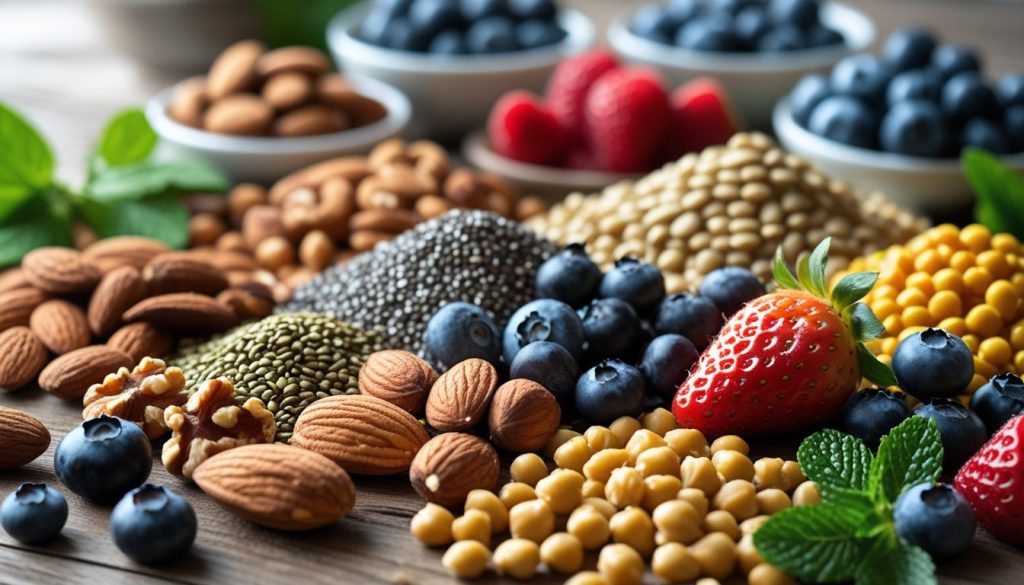
Vegan Collagen vs. Animal Collagen: A Quick Comparison
| Feature | Vegan Collagen | Animal Collagen |
|---|---|---|
| Source | Plant-based amino acids, vitamins, and minerals | Animal bones, skin, fish |
| Ethical/Sustainable | Yes | No |
| Allergen Risk | Low | Higher (fish, shellfish, bovine) |
| Bioavailability | High (with bio-identical blends) | High |
| Suitability | Vegan, vegetarian, kosher, halal | Not suitable for vegans/vegetarians |
| Environmental Impact | Low | High |
How to Choose the Right Vegan Collagen Alternative
- Check the Amino Acid Profile: Look for supplements with a complete or bio-identical amino acid blend3910.
- Look for Synergistic Ingredients: Vitamin C, hyaluronic acid, zinc, and silica enhance effectiveness1312.
- Consider Your Needs: Choose powders, capsules, or creams based on your lifestyle and preferences89.
- Read Labels Carefully: Ensure products are certified vegan and free from unnecessary additives810.
Vegan Collagen-Boosting Foods for Everyday Nutrition
In addition to supplements, a diet rich in certain plant foods can naturally support collagen production61314:
- Lentils, soy foods, beans, and legumes
- Nuts and seeds (pumpkin, chia, flax, cashews)
- Leafy greens (kale, spinach, broccoli)
- Citrus fruits, berries, kiwi
- Avocado and shiitake mushrooms
- Whole grains (quinoa, oats)
- Garlic and green tea61314
Frequently Asked Questions About Vegan Collagen
1. Is there real vegan collagen?
No, collagen is only found in animals, but vegan collagen alternatives provide the amino acids and nutrients your body needs to make its own collagen31113.
2. How do vegan collagen supplements work?
They supply amino acids, vitamins, and minerals that stimulate your body’s natural collagen production3711.
3. Are vegan collagen boosters as effective as animal collagen?
Bio-identical blends like VeCollal® and Vollagen® have shown comparable effectiveness in supporting collagen synthesis3910.
4. What are the best vegan collagen ingredients?
Amino acid complexes, vitamin C, hyaluronic acid, bamboo silica, and antioxidants are top choices13712.
5. Can I get enough collagen from food alone?
While you can boost collagen production with a nutrient-rich diet, supplements can provide more concentrated support613.
6. Are vegan collagen supplements safe?
Yes, they are generally safe and suitable for most diets. Always check for third-party testing and certifications810.
7. Who should use vegan collagen?
Anyone seeking to support skin, hair, nail, or joint health in an ethical and sustainable way7813.
8. How long does it take to see results?
Visible improvements in skin hydration and elasticity are often reported within 4–8 weeks of consistent use78.
9. Can vegan collagen help with joint pain?
Yes, the amino acids and minerals in vegan collagen boosters support joint flexibility and comfort3712.
10. What’s the best way to take vegan collagen?
Choose the format that fits your lifestyle—powder, capsule, or liquid—and combine with a balanced diet for best results89.
Conclusion: The Future of Vegan Collagen
Vegan collagen alternatives are transforming the beauty and wellness landscape, offering cruelty-free, sustainable, and scientifically backed ways to support your body’s natural collagen production. By choosing the right blend of amino acids, vitamins, and minerals—whether through supplements or whole foods—you can enjoy radiant skin, strong hair and nails, and flexible joints, all while aligning with your ethical values.
Ready to take your wellness journey further?
Discover the essential role of amino acids in collagen production and overall health in our related blog post: Explore Amino Acids and Collagen.

